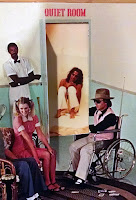I think I know why, too. It’s because of all those bands, Gen X always seemed to be the one that was approximating punk without actually being punk. Just look at the album cover: the lads wore the right “punk” clothes, they had the “punk” hair, they had the “punk” hard poses, and had the “punk” attitude but for some reason it all seemed like an affect.
Take Billy Idol as an example. The guy had the same spikey hair and insubordinate snarl as Sid Vicious, but one always felt that with Sid it was an external manifestation of his internal psychopathy, while with Billy it seemed a costume. And that’s not quite fair, because Billy and Gen X were a part of the bona fide, OG, London punk scene from the mid-70’s, before punk was even officially punk.
The problem was that the band and and their songs didn’t have the same level of pure anger, disillusionment, and fuck you attitude as other punk bands from London. And that made it seem as if they were merely playing at being punk for the sake of exploiting an emerging market.
Their eponymous first album was released in 1978.
Side 1:
|
|
Side 2:
|
I remember buying this album while still in high school, when I developed my infatuation with Elvis Costello, The Ramones, X, and The Clash. At that time I couldn’t get enough of this new music, and would scrimp and save every penny to buy records or to afford to get tickets to see live shows at venues like the Whiskey, Madame Wongs, The Roxy, The Rainbow, and other clubs in Hollywood.
It was a glorious time to be young and involved in a musical revolution. It seemed as if every time you blinked there was a new band out demanding your attention. Some of them were good, most not so good, but there was a choice and an apparent endless supply.
So when I first heard One Hundred Punks on KROQ, I immediately took an interest and got the record.
I played it.
I listened to it.
I liked it.
But I didn't love it. Even though songs like Gimme Some Truth (a great cover of a John Lennon song), Wild Youth, and One Hundred Punks are really freaking awesome, there was something about it that kept me at arm's length and stopped me from loving it in the same way halitosis might stop a dude from really loving making out with a girl, or hangovers might stop someone from really loving a night of hard drinking.
It was at this listen where that something finally crystallized for me as being this odd sense that Gen X were like a gifted actor portraying a real person, or an exceptional cover band. They were close, but just reproductions of the real thing, and that gap between them and real produced enough of a hollow sound to make a difference.
As it turns out, I’m not alone in this feeling. Others have noted Gen X’s accessibility, pop tendency, and non-threatening sound. In fact, the members of the band themselves admit that they pursued a path with their band trying to navigate between the aggression of punk and the acquiescence of mainstream.
Eventually the band broke apart for the same reasons all bands break apart, and the guys went their own way. Billy became a huge solo artist, peddling the same pseudo-punk music, attitude, and style as Gen X did, eventually becoming a bit of a caricature of himself in the process.
But this album is still quite catchy and a nice nostalgic journey to an exciting time when music was constantly changing.
Up next: Maturing from punk to performer


















